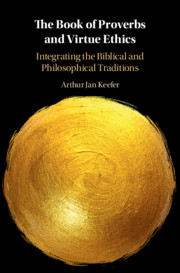Is Aristotle’s Ethics Hebraic? A Comparison of Greek and Hebrew Ethics
Aristotelian ethics has made a comeback in recent decades. Biblical interpreters of the Medieval period made extensive use of his Politics, but the Nicomachean Ethics (NE) has been most popular of late. The main advantage of using a work like Aristotle’s Ethics for biblical interpretation is that it can provide insight into the thought-world of the Bible, specifically, in this case, its ethics.
Enjoying this article? Read more from The Biblical Mind.
Adamant about “moral virtue,” the ethic of the NE involves no less than a cosmological outlook, anthropological presuppositions, an intellectual heritage, and a social context of composition and exercise. But, to find its core, we need to notice two features: the definition and acquisition of moral virtue. With these ideas the biblical material can be compared to the NE, and a plausible argument can be made: that portions of the Bible contain moral virtues in form, but that their acquisition and content remain distinctively Hebraic.
Moral Virtue in Aristotle’s Ethics and in Scripture
If any book of the Bible contains Aristotelian moral virtues, then it is the book of Proverbs. Such virtue, for Aristotle, must meet several criteria, namely, that they be (1) actions and emotions that are identifiable through praise and blame; that (2) the vices reflect excess and deficiency in action and emotion; and that (3) the virtues “hit the mean” of these actions and emotions (NE 2.6).
In other words, moral virtues deal with action and emotion, which materialize through praise—textual commendation in this case—and “hit the mean,” not by being mediocre or striking some average, middle amount but by being exercised “at the right time, on the right occasion, towards the right people, for the right purpose and in the right manner” (NE 2.6.11). That is just what we see in Proverbs, as it approves and disapproves of certain actions and emotions, and, when disapproved of, these actions and emotions are faults of excess or deficiency—i.e., doing something too much or too little—and that those approved by the book “hit the mean.”
The action of work, for instance, meets each criterion for Aristotelian moral virtue. Praise for the one who works hard and disdain for the one who does not are heard throughout Proverbs, and both sentiments are put emphatically at the outset of its first collection: “A slack hand causes poverty, but the hand of the diligent makes rich. A child who gathers in summer is prudent, but a child who sleeps in harvest brings shame” (Prov 10:4–5). Declaring that the diligent person amasses wealth, embodies prudence and most likely wisdom (10:1), while the slack-handed laborer falls to poverty, shames himself and his family, and is probably classed as a fool (10:1) is Proverbs’ way of approving of the one and denouncing the other, expressing what Aristotle refers to as “praise and blame.” The lazy person lies at the deficient end of the labour spectrum, failing to work enough—i.e., he works too little—while the “diligent” worker, here, presumably works to the right degree.
Proverbs is certainly indubitable about one fact: that humans cannot acquire virtue without divine help.
For these actions to fit neatly into Aristotle’s understanding of virtue and vice, Proverbs also needs to defame the person who works too much. For Aristotle’s understanding of virtue is not just about doing the right action, such as working, but about doing that action in the right way, at the right time, towards the right person, and so on; working too little and too much are both vices. A virtue—in this case, diligence—is spotted between these two poles.
Compared to the problem of laziness, Proverbs seems far less interested in the problem of working too much. For the “sluggard” shows his indolence throughout the book, and yet the argument can be made that certain forms of excessive work are condemned. Proverbs 21:5 contrasts the “diligent” person with the person who works in “haste.” While the hasty worker might not work enough with respect to effort, when it comes to timing he works too quickly.
Haste is excessive in its speed, and Aristotle would recognize such a category, acknowledging that hasty work meets the criteria for the moral vice of excess, thus completing the spectrum of work’s virtue and vice in Proverbs: working too little (laziness), working too much (hastiness, or for the wrong reasons; so 23:4-5; 29:19), and working virtuously (diligence). This spectrum only captures the form or definition of moral virtue. How humans acquire that virtue is another question altogether.
The Acquisition of Virtue: Habits, Teachers, and the Lord
The acquisition of virtue, and relatedly its cultivation, come about in several ways for Aristotle. On a practical level, hitting the mean requires its own intellectual virtue of “prudence” (phronesis). To say the right thing at the right time, or to work diligently rather than too much or too little, or to give away the appropriate amount of money all require a faculty of discernment. Aristotle remains unfortunately vague about how humans acquire that faculty, but he does indicate that we need good teachers and experience (NE 6.5.1; 6.8.5-6; 6.12.2).
Interested in reading more about this topic? Check out Arthur Keefer’s The Book of Proverbs and Virtue Ethics.
“Habituation” too aids the development of virtue, though it is mainly a matter of being trained in the right practices from a young age and hence owes its effectiveness to one’s education. Perhaps most important of all, though, is law. The NE concludes with an extensive discussion of how law can cultivate virtue among the populace, perhaps doing so most effectively on a lived, communal scale (10.9.6–17).
Proverbs is, in some ways, clearer, and certainly indubitable about one fact: that humans cannot acquire virtue without divine help. One gets wise with the “fear of the Lord” and by the instruction of godly teachers, as the “father” tirelessly bids his son to listen to his teaching and declares that wisdom comes “from the mouth of the Lord” (2:1–6). Whether or not habit plays a role is more difficult to see, but perhaps the book’s repetition and the process required to internalize it—reading, thinking, attempting, and (re)learning—suggest that virtue grows through training. Looking throughout the Hebrew Bible, similar moral concepts appear in different forms, in narrative, law, and song, making it possible that the Bible, in some unifying way, forms virtuous people. That is a much larger thesis than this article can manage. But what can be said, finally, is that the mechanics of this acquisition and cultivation become only clearer in the New Testament.
Jesus Christ describes the ethical life as one given over entirely to God. The meek, the poor in spirit, and those who “hunger and thirst for righteousness” are the sort of people belonging to the kingdom of heaven (Matt 5:2–12). Where Proverbs warns of the dangers of acquiring wealth (1:10–19) and toiling in haste (21:5), Jesus casts our vision towards heaven—the real home of his disciple’s treasure (Matt 6:19–24)—and explains in dramatic detail the lack of worry that his followers should have in day-to-day life (6:25-34).
The Epistles pick up on this but also disclose more about the means of moral formation. No longer content with phrases like “being wise” or “fearing the Lord” (i.e. Proverbs), Paul depicts the Christian ethic as one of “new life” empowered by the Holy Spirit (Eph 4:17–24), and even James, who may sound less heavenly-minded than any NT book, makes the moral life one of christology (1:1), God-given wisdom (1:5-8; 3:13–15), and freedom from sin (5:19–20). Therefore, though most of the NT “virtues” and their method of cultivation would have found little welcome in Aristotle’s ethics and the world of Athens, some of the Bible—its Hebraic tradition especially—contains moral concepts that, in form, can be considered Aristotelian.
Did you enjoy this article? Check out The Biblical Mind podcast.






